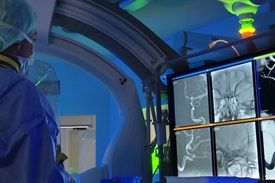 Siemens Healthineers and the World Stroke Organization (WSO) have announced a two-year partnership to develop the acute stroke workforce, and improve treatment and care for stroke.
Siemens Healthineers and the World Stroke Organization (WSO) have announced a two-year partnership to develop the acute stroke workforce, and improve treatment and care for stroke.
Stroke is the second-leading cause of death and the third-leading cause of disability in adults—and, as stated in a joint press release from Siemens and the WSO, its incidence is rising rapidly in low- and middle-income countries (LMICs), where a growing burden of disease is challenging already-fragile health systems.
The release also notes that this has a marked negative social and economic impact on individuals, their families, and broader society. And, in addition to the human cost, the global financial cost of stroke is set to reach US$1.59 trillion by 2050. Some 87% of the disease burden will be experienced in LMICs, the release adds.
“Stroke treatments exist that we know deliver better outcomes for patients, and we have evidence that these can be delivered cost-effectively in low-, middle- and high-income countries,” said WSO president Sheila Martins (Federal University of Rio Grande do Sul, Porto Alegre, Brazil). “Supporting healthcare providers and clinicians to deliver the best possible standard of care is at the core of the WSO mission, and we need all parts of the care system to pull together to alter this disastrous disease trajectory.”
The Siemens-WSO partnership will have a new global scope, building on a successful programme of hands-on workshops to deliver education and training programmes aimed at strengthening clinical capacity and driving access to mechanical thrombectomy—a procedure that significantly improves outcomes for patients but remains unavailable to most who would benefit.
Delivery of mechanical thrombectomy requires a complex range of actions across the healthcare system, from raising public awareness of stroke symptoms to ensuring timely hospital presentation, to bringing acute healthcare systems up to levels that enable fast diagnosis and clinical decision-making, the release continues. WSO programmes work to address this system change through a Stroke Center Certification programme, clinical education, and public awareness campaigns.
“By providing healthcare professionals with valuable skills to make timely and informed diagnoses, and equipping healthcare systems with the latest imaging and therapy technologies, we aim to make effective stroke care available to everyone,” said Carsten Bertram, head of Advanced Therapies at Siemens Healthineers. “This partnership supports our goal of lowering the global burden of stroke and will really help move the needle in stroke care around the world.”
Siemens states in the release that it provides holistic solutions along the entire stroke pathway, with the aim of getting as many stroke patients to the right treatment as fast and as efficiently as possible.









